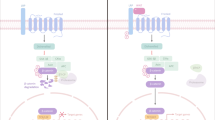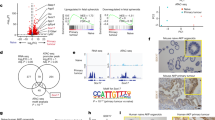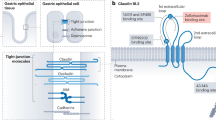Abstract
Angiogenesis is essential in tumor progression and metastatic process, and increased angiogenesis has been associated with poor prognosis and relapse of colorectal cancer (CRC). VEGF has become the main target of anti-angiogenic therapy. However, most patients relapse after an initial response or present a resistance to the treatment. Identification of new pro-angiogenic factors may help to improve anti-angiogenic therapy. In this study, we demonstrated that the pro-hormone progastrin (PG), over-expressed in CRC, recognized as a growth factor, is a potent pro-angiogenic factor. In transgenic mice and human colorectal HPs producing high levels of PG, we correlated PG overexpression with an increased vascularization. In vitro, exogenous PG and conditioned media (CM) from CRC cells producing PG increased endothelial cell proliferation and migration. We also showed that treatment with exogenous PG can increase the ability of endothelial cells to form capillary-like structures. Moreover, we demonstrated that PG enhanced endothelial permeability. The finding that PG stimulated the phosphorylation of vascular endothelial (VE)-cadherin, p125-FAK, paxillin and induced actin remodelling was consistent with a role of these components in PG-stimulated endothelial cell migration and permeability. The pro-angiogenic effects observed with CM were significantly inhibited when CRC cells expressed a PG shRNA. In vivo, we found an important decrease in tumor growth and neovascularization when the CRC cells expressing the PG shRNA were xenografted in mice or in the chick chorioallantoic membrane model. We also observed an increase in the coverage of blood vessels by pericytes and a decrease in endothelial permeability when PG expression was blocked. Our results demonstrate that PG is a new pro-angiogenic factor in CRC and an attractive therapeutic target.
This is a preview of subscription content, access via your institution
Access options
Subscribe to this journal
Receive 50 print issues and online access
$259.00 per year
only $5.18 per issue
Buy this article
- Purchase on Springer Link
- Instant access to full article PDF
Prices may be subject to local taxes which are calculated during checkout







Similar content being viewed by others
References
Rmali KA, Puntis MC, Jiang WG . Tumour-associated angiogenesis in human colorectal cancer. Colorectal Dis 2007; 9: 3–14.
Takahashi Y, Kitadai Y, Bucana CD, Cleary KR, Ellis LM . Expression of vascular endothelial growth factor and its receptor, KDR, correlates with vascularity, metastasis, and proliferation of human colon cancer. Cancer Res 1995; 55: 3964–3968.
Tokunaga T, Oshika Y, Abe Y, Ozeki Y, Sadahiro S, Kijima H et al. Vascular endothelial growth factor (VEGF) mRNA isoform expression pattern is correlated with liver metastasis and poor prognosis in colon cancer. Br J Cancer 1998; 77: 998–1002.
Bergers G, Hanahan D . Modes of resistance to anti-angiogenic therapy. Nat Rev Cancer 2008; 8: 592–603.
Shojaei F . Anti-angiogenesis therapy in cancer: current challenges and future perspectives. Cancer Lett 2012; 320: 130–137.
Clarke PA, Dickson JH, Harris JC, Grabowska A, Watson SA . Gastrin enhances the angiogenic potential of endothelial cells via modulation of heparin-binding epidermal-like growth factor. Cancer Res 2006; 66: 3504–3512.
Nemeth J, Taylor B, Pauwels S, Varro A, Dockray GJ . Identification of progastrin derived peptides in colorectal carcinoma extracts. Gut 1993; 34: 90–95.
Siddheshwar RK, Gray JC, Kelly SB . Plasma levels of progastrin but not amidated gastrin or glycine extended gastrin are elevated in patients with colorectal carcinoma. Gut 2001; 48: 47–52.
Van Solinge WW, Nielsen FC, Friis-Hansen L, Falkmer UG, Rehfeld JF . Expression but incomplete maturation of progastrin in colorectal carcinomas. Gastroenterology 1993; 104: 1099–1107.
Smith AM, Watson SA . Gastrin and gastrin receptor activation: an early event in the adenoma-carcinoma sequence. Gut 2000; 47: 820–824.
Baldwin GS, Hollande F, Yang Z, Karelina Y, Paterson A, Strang R et al. Biologically active recombinant human progastrin(6-80) contains a tightly bound calcium ion. J Biol Chem 2001; 276: 7791–7796.
Brown D, Yallampalli U, Owlia A, Singh P . pp60c-Src Kinase mediates growth effects of the full-length precursor progastrin1-80 peptide on rat intestinal epithelial cells, in vitro. Endocrinology 2003, Jan 144: 201–211.
Hollande F, Lee DJ, Choquet A, Roche S, Baldwin GS . Adherens junctions and tight junctions are regulated via different pathways by progastrin in epithelial cells. J Cell Sci 2003; 116((Pt 7)): 1187–1197.
Singh P, Lu X, Cobb S, Miller BT, Tarasova N, Varro A et al. Progastrin1-80 stimulates growth of intestinal epithelial cells in vitro via high-affinity binding sites. Am J Physiol Gastrointest Liver Physiol 2003; 284: G328–G339.
Umar S, Sarkar S, Cowey S, Singh P . Activation of NF-kappaB is required for mediating proliferative and antiapoptotic effects of progastrin on proximal colonic crypts of mice, in vivo. Oncogene 2008; 27: 5599–5611.
Wu H, Owlia A, Singh P . Precursor peptide progastrin(1-80) reduces apoptosis of intestinal epithelial cells and upregulates cytochrome c oxidase Vb levels and synthesis of ATP. Am J Physiol Gastrointest Liver Physiol 2003; 285: G1097–G1110.
Singh P, Velasco M, Given R, Varro A, Wang TC . Progastrin expression predisposes mice to colon carcinomas and adenomas in response to a chemical carcinogen. Gastroenterology 2000; 119: 162–171.
Wang TC, Koh TJ, Varro A, Cahill RJ, Dangler CA, Fox JG et al. Processing and proliferative effects of human progastrin in transgenic mice. J Clin Invest 1996; 98: 1918–1929.
Ferrand A, Bertrand C, Portolan G, Cui G, Carlson J, Pradayrol L et al. Signaling pathways associated with colonic mucosa hyperproliferation in mice overexpressing gastrin precursors. Cancer Res 2005; 65: 2770–2777.
Dimaline R, Varro A . Novel Roles of Gastrin. J Physiol 2014; 592: 2951–2958.
Ferrara N, Gerber HP, LeCouter J . The biology of VEGF and its receptors. Nat Med 2003; 9: 669–676.
Chen XL, Nam JO, Jean C, Lawson C, Walsh CT, Goka E et al. VEGF-induced vascular permeability is mediated by FAK. Dev Cell 2012; 22: 146–157.
Gavard J, Gutkind JS . VEGF controls endothelial-cell permeability by promoting the beta-arrestin-dependent endocytosis of VE-cadherin. Nat Cell Biol 2006; 8: 1223–1234.
Carmeliet P, Lampugnani MG, Moons L, Breviario F, Compernolle V, Bono F et al. Targeted deficiency or cytosolic truncation of the VE-cadherin gene in mice impairs VEGF-mediated endothelial survival and angiogenesis. Cell 1999; 98: 147–157.
Corada M, Mariotti M, Thurston G, Smith K, Kunkel R, Brockhaus M et al. Vascular endothelial-cadherin is an important determinant of microvascular integrity in vivo. Proc Natl Acad Sci USA 1999; 96: 9815–9820.
Dejana E . Endothelial cell-cell junctions: happy together. Nat Rev Mol Cell Biol 2004; 5: 261–270.
Esser S, Lampugnani MG, Corada M, Dejana E, Risau W . Vascular endothelial growth factor induces VE-cadherin tyrosine phosphorylation in endothelial cells. J Cell Sci 1998; 111 (Pt 13): 1853–1865.
Abedi H, Zachary I . Vascular endothelial growth factor stimulates tyrosine phosphorylation and recruitment to new focal adhesions of focal adhesion kinase and paxillin in endothelial cells. J Biol Chem 1997; 272: 15442–15451.
Do C, Bertrand C, Palasse J, Delisle MB, Shulkes A, Cohen-Jonathan-Moyal E et al. A new biomarker that predicts colonic neoplasia outcome in patients with hyperplastic colonic polyps. Cancer Prev Res 2012; 5: 675–684.
Des Guetz G, Uzzan B, Nicolas P, Cucherat M, Morere JF, Benamouzig R et al. Microvessel density and VEGF expression are prognostic factors in colorectal cancer. Meta-analysis of the literature. Br J Cancer 2006; 94: 1823–1832.
Clarke JM, Hurwitz HI . Understanding and targeting resistance to anti-angiogenic therapies. J Gastrointest Oncol 2013; 4: 253–263.
Duckworth CA, Clyde D, Worthley DL, Wang TC, Varro A, Pritchard DM . Progastrin-induced secretion of insulin-like growth factor 2 from colonic myofibroblasts stimulates colonic epithelial proliferation in mice. Gastroenterology 2013; 145: 197–208.
Hollande F, Imdahl A, Mantamadiotis T, Ciccotosto GD, Shulkes A, Baldwin GS . Glycine-extended gastrin acts as an autocrine growth factor in a nontransformed colon cell line. Gastroenterology 1997; 113: 1576–1588.
Jin G, Westphalen CB, Hayakawa Y, Worthley DL, Asfaha S, Yang X et al. Progastrin stimulates colonic cell proliferation via CCK2R- and β-arrestin-dependent suppression of BMP2. Gastroenterology 2013; 145: 820–830.
Sirvent A, Benistant C, Pannequin J, Veracini L, Simon V, Bourgaux JF et al. Src family tyrosine kinases-driven colon cancer cell invasion is induced by Csk membrane delocalization. Oncogene 2010; 29: 1303–1315.
Kowalski-Chauvel A, Najib S, Tikhonova IG, Huc L, Lopez F, Martinez LO et al. Identification of the F1-ATPase at the cell surface of colonic epithelial cells: role in mediating cell proliferation. J Biol Chem 2013; 287: 41458–41468.
Monaghan-Benson E, Burridge K . The regulation of vascular endothelial growth factor-induced microvascular permeability requires Rac and reactive oxygen species. J Biol Chem 2009; 284: 25602–25611.
Bertrand C, Kowalski-Chauvel A, Do C, Resa C, Najib S, Daulhac L et al. A gastrin precursor, gastrin-gly, upregulates VEGF expression in colonic epithelial cells through an HIF-1-independent mechanism. Int J Cancer 2010; 126: 2847–2857.
Ribatti D, Nico B, Vacca A, Presta M . The gelatin sponge-chorioallantoic membrane assay. Nat Protoc 2006; 1: 85–91.
Ciccotosto GD, McLeish A, Hardy KJ, Shulkes A . Expression, processing, and secretion of gastrin in patients with colorectal carcinoma. Gastroenterology 1995; 109: 1142–1153.
Acknowledgements
We thank Prof Shulkes, Melbourne University (Australia) for the specific antibody against Progastrin. This work was supported by: grants from INSERM and ANR.
Author information
Authors and Affiliations
Corresponding author
Ethics declarations
Competing interests
The authors declare no conflict of interest.
Additional information
Supplementary Information accompanies this paper on the Oncogene website
Rights and permissions
About this article
Cite this article
Najib, S., Kowalski-Chauvel, A., Do, C. et al. Progastrin a new pro-angiogenic factor in colorectal cancer. Oncogene 34, 3120–3130 (2015). https://doi.org/10.1038/onc.2014.255
Received:
Revised:
Accepted:
Published:
Issue Date:
DOI: https://doi.org/10.1038/onc.2014.255
This article is cited by
-
The prognostic and therapeutic role of hormones in colorectal cancer: a review
Molecular Biology Reports (2019)
-
Progastrin: a potential predictive marker of liver metastasis in colorectal cancer
International Journal of Colorectal Disease (2017)
-
RETRACTED ARTICLE: SARI inhibits angiogenesis and tumour growth of human colon cancer through directly targeting ceruloplasmin
Nature Communications (2016)



